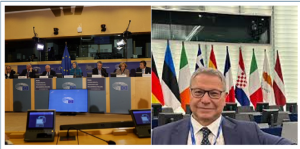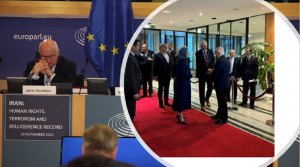(Video)European Parliament Hosts NCRI President-elect Maryam Rajavi for Key Conference on Iran’s Future
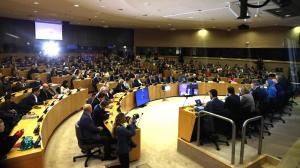
On November 20, the European Parliament in Brussels invited Mrs. Maryam Rajavi, President-elect of the National Council of Resistance of Iran (NCRI), as the keynote speaker for a landmark conference dedicated to the Iranian people’s fight for freedom and democracy.
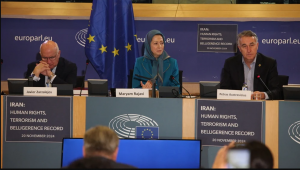
Mrs. Maryam Rajavi highlighted the NCRI’s Five Key Elements for democratic change in Iran. These included a discontented populace led by Resistance Units, the PMOI/MEK’s 60-year legacy, the NCRI’s diverse coalition promoting equality, and Ten-Point Plan.
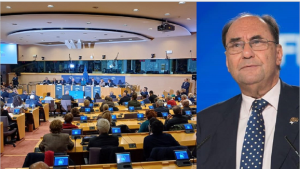
Dr. Vidal Quadrassaid,"Urging solidarity with the Iranian people. “Let us not be silent in the face of tyranny. Let us stand with the people of Iran and their legitimate resistance until final victory,” he added, to countinue the struggle for democracy in Iran.
Mr.Zarzalejos,"The vital role of Iranian women in the resistance, calling them “true pioneers of resistance” whose courage is “the driving force for change.”
The event, organized to discuss the path toward a free and secular Iran, attracted significant participation, including numerous Members of the European Parliament (MEPs), their staff, and members of the Iranian European community. Mrs. Rajavi presented the NCRI’s Ten-Point Plan as a roadmap for a democratic Iran and emphasized the need for the international community to stand firmly with the Iranian Resistance.
Prominent speakers included Dr. Alejo Vidal-Quadras, former Vice President of the European Parliament; MEP Arkadiusz Mularczyk of Poland, former Deputy Foreign Minister; MEP Carlo Ciccioli of Italy; MEP Isabel Benjumea of Spain; MEP Estelle Ceulemans; MEP Javier Zarzalejos of Spain, Chair of the LIBE Committee; MEP Matej Tonin of Slovenia; MEP Milan Zver of Slovenia, Co-chair of Friends of Free Iran; MEP Petras Auštrevičius of Lithuania; MEP Rasa Juknevičienė of Lithuania, former Defense Minister; and MEP Ryszard Czarnecki of Poland.
The conference highlighted widespread support for the Iranian Resistance’s efforts to achieve regime change, as well as the European Union’s role in addressing Tehran’s human rights abuses and destabilizing activities.
In her speech, Mrs. Maryam Rajavi highlighted the NCRI’s Five Key Elements for democratic change in Iran. These included a discontented populace led by Resistance Units, the PMOI/MEK’s 60-year legacy, the NCRI’s diverse coalition promoting secularism and equality, vast Iranian diaspora support, and global endorsement of the NCRI’s Ten-Point Plan.
Rajavi emphasized, “The NCRI’s Ten-Point Plan offers a vision for a secular, democratic, and non-nuclear Iran, securing human rights, gender equality, and autonomy for ethnic groups. This is not just a path for Iran but a model for regional and global stability.”
The NCRI President-elect criticized decades of Western appeasement and urged the EU to adopt a decisive stance, saying, “Reject all forms of appeasement and take a firm policy toward the mullahs’ terrorist regime. Supporting the Iranian people’s demand for regime change is key to global and regional peace.”
Hosting the conference, MEP Petras Auštrevičius called for a decisive and united European response to the threats posed by Iran’s regime, both domestically and internationally. Speaking as a long-time member of the Friends of Free Iran group, he outlined the failures of appeasement policies and emphasized the need to recognize and support the Iranian people’s fight for freedom.
Auštrevičius pointed out that the regime’s actions, including state-sponsored terrorism and human rights abuses, have transcended Iran’s borders. “The regime in Iran is a threat, not only for its own people but also to Europe, the region, and global peace,” he warned.
He noted that Iran’s export of fear and repression through the IRGC requires immediate action, stating, “Member states like my own country Lithuania have called for the designation of the IRGC as a terrorist organization… a critical step in curbing Tehran’s malign influence abroad and domestic repression.”
Highlighting the leadership of Maryam Rajavi and the NCRI, MEP Auštrevičius praised their vision for a democratic, secular, and free Iran. “Under the leadership of Madam Rajavi, the National Council of Resistance of Iran has presented a democratic vision for a future Iran—one based on human rights, gender equality, and the rule of law,” he said. He acknowledged the growing support for this platform both inside and outside of Iran.
He also paid tribute to the courage of Resistance Units and the Iranian people’s resilience in the face of state violence. “Supporting their right to self-defense aligns with the democratic principles we uphold in Europe,” he added.
Auštrevičius concluded by urging the EU to take a firm stance: “The right policy choice for the European Union is to stand with them on the right side of history for a brighter and freer future of Iran.” He expressed hope that, with EU support, Iran’s people would achieve freedom sooner rather than later.
MEP Milan Zver expressed unwavering support for the Iranian people’s struggle for democracy and highlighted the critical role of the NCRI in leading this fight.
Zver praised the NCRI for its resilience and organization, emphasizing its readiness to lead Iran toward a democratic future. “The NCRI has proven through its work that it is persistent, democratically organized, excellently led, and equipped with Maryam Rajavi’s Ten-Point Plan for the future of Iran3,” Zver noted. He affirmed that the NCRI is “capable of changes and has everything that is needed when the responsibility for the future of Iran will sooner or later be accepted.”
Calling for a reevaluation of international policies, the Co-Chair of the Friends of Free Iran group criticized past decisions to lift sanctions despite ongoing human rights violations by the Iranian regime. He urged European institutions and politicians to show more courage in confronting Tehran. “It is time to rethink and reshape this policy. With the new European Commission comes new hope for that,” he said.
Speaking nearly a year after surviving an assassination attempt orchestrated by the Iranian regime, Dr. Alejo Vidal Quadras declared, “This brutal attempt to silence me has only strengthened my resolve.
For decades, the regime has waged a well-funded disinformation campaign to discredit the PMOI and isolate its supporters. But having witnessed their work firsthand, as many of other members of the parliament here present, I know that PMOI is a legitimate popular force for a free and democratic Iran.”
Dr. Vidal Quadras highlighted the regime’s persistent disinformation campaigns targeting the People’s Mujahedin of Iran (PMOI/MEK)2 and the NCRI, noting their legitimacy as democratic alternatives.
“I know that PMOI is a legitimate popular force for a free and democratic Iran,” he affirmed, urging members of the European Parliament to reject Tehran’s falsehoods. He underscored the international recognition of the Iranian Resistance, pointing out that “137 world leaders affirm their support for the PMOI and their members in Ashraf 3.”
A staunch advocate for the NCRI’s Ten-Point Plan, Dr. Vidal Quadras lauded its vision for a secular, democratic, and non-nuclear Iran. “This plan champions human rights, gender equality, and the separation of religion from the state,” he stated, describing it as a beacon of hope for Iran, the region, and the world.
He emphasized the role of the Resistance Units in Iran, asserting that the PMOI represents a true democratic alternative with deep roots in Iranian society.
The former EU Vice President condemned the alarming rise in executions under the presidency of Masoud Pezeshkian, labeling the regime as a “pitiless killing machine.”
Citing Amnesty International’s report, he revealed that Iran accounted for 74% of all executions worldwide in 2023, a figure that has surged even higher in recent months. “The Iranian regime is a pitiless killing machine,” he declared, criticizing the portrayal of Pezeshkian as a moderate.
Dr. Vidal Quadras closed his speech with a call to action, urging solidarity with the Iranian people. “Let us not be silent in the face of tyranny. Let us stand with the people of Iran and their legitimate resistance until final victory,” he concluded, reaffirming his commitment to the struggle for freedom and democracy in Iran.
MEP Javier Zarzalejos delivered a powerful speech highlighting the urgent need for a decisive European Union policy against the Iranian regime while praising the efforts of the NCRI and its President-elect, Maryam Rajavi.
Zarzalejos called the regime “not the evil we know, but just evil,” underscoring its destabilizing actions in the region and globally. He noted its interference in Syria, Yemen, and Lebanon, its support for terrorist groups, and its nuclear ambitions, which he labeled “one of the most serious challenges of our time.”
He emphasized the urgency of including the IRGC on the EU’s list of terrorist organizations, a measure the European Parliament has consistently advocated.
The Spanish MEP lauded the NCRI’s Ten-Point Plan, describing it as a “vision for a free and democratic Iran,” which includes commitments to human rights, gender equality, secular governance, and environmental protection.
“This political, civic, and social platform represents the future that Iranians aspire to,” Zarzalejos said, adding that it should form the foundation of any political solution.
He highlighted the vital role of Iranian women in the resistance, calling them “true pioneers of resistance” whose courage is “the driving force behind this change.”
MEP Estelle Ceulemans, a newly elected member of the European Parliament from the S&D Group, delivered a heartfelt speech. Drawing from her background as a feminist and trade unionist, Ceulemans underscored Europe’s historical foundation on strong resistance movements and the importance of solidarity against oppressive regimes.
Highlighting her personal connection to Iran’s struggle, Ceulemans promised to be a voice for Iranian women within the European Parliament. “If tomorrow, this horrible regime is weakened despite repression and opposition, it will be thanks to the resistance of Iranian women, women like you who engage and will always stand strong,” she stated.
Ceulemans affirmed her commitment to supporting the Iranian Resistance and women fighting for freedom, calling it a shared responsibility of the European Parliament. “You can count on us,” she concluded, pledging continued solidarity with the Iranian people.
MEP Carlo Ciccioli called for unwavering international support for the Iranian people and their fight for freedom and democracy. He praised Maryam Rajavi as an inspirational leader and commended her Ten-Point Plan as a “clear roadmap toward a future where human rights, freedom of expression, justice, and equality are not merely legitimate aspirations but tangible realities for all Iranian people.”
Ciccioli expressed his pride in supporting the Iranian Resistance for over two decades, reaffirming his full commitment to their cause. Highlighting the oppressive nature of the Iranian regime, he noted its systematic repression of its own citizens, destabilization of the Middle East, and interference in neighboring countries. “These actions clearly reveal the regime’s destructive nature,” he stated.
The Italian MEP emphasized the need for the international community to respond firmly, advocating for intensified sanctions and increased political pressure. He stressed, “Stability and peace in the Middle East can only be achieved through radical change in Iran, paving the way for a true democracy capable of guaranteeing freedom and rights for its people.”
Concluding his remarks, Ciccioli declared, “The Iranian Resistance is fighting for this goal and deserves our full support. This fight concerns not only Iran’s future but also peace and stability throughout the Middle East.”
MEP Matej Tonin voiced strong support for the Iranian people’s struggle for freedom and democracy while rejecting attempts to present false alternatives to the current regime.
Tonin praised Maryam Rajavi’s leadership, emphasizing her clear stance that the goal of her movement is not to seize power but to empower the Iranian people to freely choose their government.
“Madam Rajavi, you have repeatedly stated that the goal of your struggle is not the seizure of power, but to ensure the Iranian people the right to freely choose their own government,” Tonin remarked, commending this commitment to democratic principles.
Criticizing efforts to portray the son of the former Shah as an alternative, the Slovenian MEP said these attempts mislead the Iranian people, suggesting they must choose between the dictatorship of the past and the current religious tyranny. “The Iranian people are looking towards the future of a free, democratic, and prosperous Iran,” Tonin declared.
Drawing parallels with his own country’s history, Tonin reflected on Slovenia’s fight for self-determination 35 years ago. “We Slovenians were fighting for the right to decide on our own future, and the same I wish today for the Iranian people—nothing more and nothing less,” he said.
Tonin concluded with a call for solidarity, urging all democrats in Europe and worldwide to support the Iranian people in their quest for freedom and self-determination.
In his remarks, MEP Arkadiusz Mularczyk urged the West to adopt a firm and uncompromising stance against the Iranian regime. He emphasized the importance of supporting the Iranian people’s fight for democracy and human rights.
“The brave people of Iran who want regime change deserve our full support in their efforts toward democracy and the protection of human rights,” he declared.
Mularczyk encouraged the European Union to classify the Iranian Revolutionary Guard Corps (IRGC) as a terrorist organization and address Iran’s influence in criminal networks across Europe. He also highlighted the role of social media in amplifying the Iranian opposition’s message, calling on MEPs to use these platforms to build support for democratic change.
The Polish MEP also expressed hope for renewed U.S. leadership, believing that a stronger American policy could force the Iranian regime into negotiations that might lead to regime change. Calling for consistency and resilience in EU policy, Mularczyk remarked, “The Iranian people are counting on the EU to be strong and resilient over the current Iranian regime.” He concluded by welcoming events like this conference, which raise awareness and support for the Iranian people’s struggle for freedom.
Former MEP Dorien Rookmaker emphasized the urgent need for democracy in Iran, stating, “It’s very important, not only for peace in Iran but also for peace in Europe and the whole world.”
Rookmaker urged the European Commission to take decisive action against Tehran, stating, “The European Commission must understand and realize that it is very important that the IRGC gets on the list of terrorist organizations.” She strongly criticized the EU’s current policy of appeasement, asserting, “Appeasement does not help.”
Commending Maryam Rajavi’s leadership, she said, “She has a plan for a democratic Iran, and it is very, very important for the whole wide world that it will be instated as soon as possible.” Rookmaker concluded by pledging support for the Iranian Resistance, expressing gratitude for Rajavi’s sacrifices in the fight for freedom.
To view the whole text, please use the link below.
https://www.ncr-iran.org/en/news/european-parliament-hosts-ncri-president-elect-maryam-rajavi-for-key-conference-on-irans-future/
If you wish to receive the NCRI weekly Newsletter, please use the following link to subscribe: https://bit.ly/3SMgEla
Shahin Gobadi
NCRI
+33 6 61 65 32 31
email us here
1 https://www.ncr-iran.org/en/about-ncri/ncri/alternative/
2 https://english.mojahedin.org/a-primer-on-the-history-of-the-peoples-mojahedin-organization-of-iran/
3 https://www.ncr-iran.org/en/maryam-rajavis-ten-point-plan-for-future-iran/

